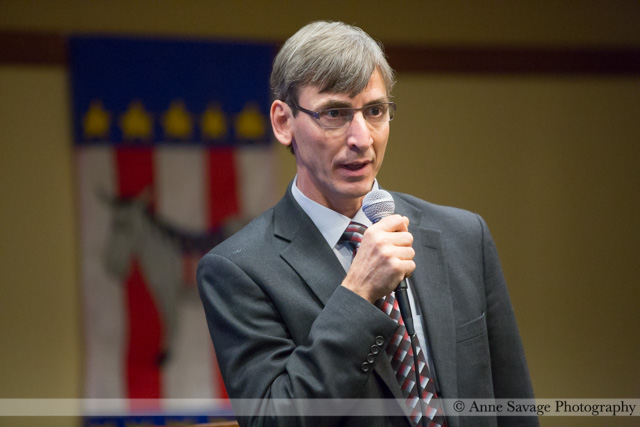The following is a guest post by Paul Clements, the Democratic candidate for Michigan’s 6th Congressional District seat now held by Big Oil puppet Fred Upton. Clements ran for this seat in 2014. Though he was ultimately unsuccessful, he received a huge boost from the Mayday PAC which spent $1.5 million to support his candidacy. I interviewed him then (HERE).
Enjoy.

The Cost of Congressman Upton’s Climate Science Denial
Once upon a time Congressman Upton said we need to consider all the options for reducing greenhouse gas emissions. But in 2011, when he became chair of the House Energy and Commerce Committee, he also became the House’s leading opponent of federal action to restrain global warming.
With the Paris climate change conference approaching, it’s a good time to consider the cost of Upton’s climate science denial.
In 1992 President George H. W. Bush signed the Framework Convention, committing to stabilize greenhouse gas emissions at levels that would prevent dangerous interference with the climate system. His son campaigned in 2000 on a platform including action on climate change, but as President he encouraged inaction. The eight years we lost on George W. Bush’s watch are on him. In 2009 President Obama and House Democrats tried to pass climate legislation, but it died in the Senate. In 2010 Republicans won a majority in the House, and the chairmanship of Energy and Commerce passed to Upton. Perhaps any Upton climate bill would have died in the Senate, but, of course, there was no such bill. Worldwide carbon dioxide emissions continued to rise, and the cost of inaction increased with each passing year.
We have already seen dangerous interference with the climate system. Hurricanes Katrina and Sandy, drought and forest fires in California and Oregon, a third of Pakistan under water from an extraordinary monsoon, drought and crop failure in Syria contributing to the current conflict, and other weather extremes too numerous to mention are all consistent with effects from climate change.
We should be well down the curve for declining emissions, but they are still rising. Soon there will be enough energy infrastructure in place to take the globe to two degrees of warming, the point beyond which scientists say destruction spins out of control. So far nine tenths of the additional heat has gone into the oceans, and some of this will return to the atmosphere no matter what we do. The best deal expected from Paris will not be nearly enough to stop global warming at two degrees.
The truth, and the problem, is that global carbon dioxide emissions have a terrible momentum, and we can’t predict on whom, specifically, the highest costs will fall. We will see much worse droughts and forest fires than the ones in California. There will be much worse hurricanes than Katrina and Sandy. Drought and rising seas will create hundreds of millions of climate refugees. We will lose many plant and animal species. Conflicts will multiply.
Expectations for sea levels to rise about three feet in this century include estimates of less than an inch from Antarctica. But Antarctica could give us five or six feet, so we would lose many more river valleys and coastal cities. Millions of farmers in Pakistan and India depend on the Indus River, but it goes through India first. Water tables for Indian farmers are already falling too fast. If India decides it needs the Indus waters, how will nuclear-armed Pakistan respond? In this century global warming could cause the Amazon rainforest to die off, the Indian monsoon to collapse, the Great Barrier Reef to disintegrate, and/or the Gulf Stream to move south, bringing weather like that of Edmonton Canada to London. There will be times when climate change will drive multiple simultaneous crises – perhaps in one year a global food crisis, several million new climate refugees, and a major water war.
Congressman Upton’s leadership could have made the difference. If the chair of the House Energy and Commerce Committee had pushed for robust action, we might have seen stronger American leadership and earlier global action. Still, the cost of Upton’s climate science denial remains dependent on what we do next. Maybe Paris will give us a world-wide program to re-engineer or decommission established energy infrastructure. Maybe we’ll see oil companies placing most of their reserves out of bounds, a crash investment program in renewables, and a generous fund to help global warming’s most vulnerable victims. Maybe, but this will require the very improvements in international cooperation that Republicans seem to fear, and it would be expensive.
The clock is ticking. The problem is growing. We can no longer afford to stand by and hope for the best while experiencing the worst.
[Photo credit: Anne C. Savage, special to Eclectablog]



